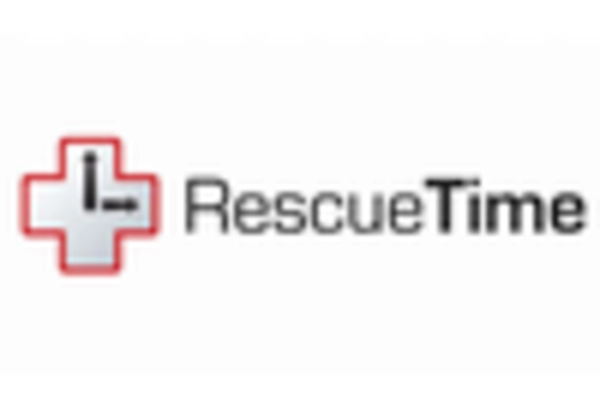Growing Focus on Employee Well-Being
The time tracking software market in Japan is increasingly aligning with the growing focus on employee well-being. Organizations are recognizing the importance of work-life balance and are seeking tools that not only track hours but also promote healthier work habits. Recent surveys indicate that over 70% of employees express a desire for more flexible working conditions, which has prompted companies to adopt time tracking solutions that facilitate this shift. Features such as break reminders, workload management, and productivity analytics are becoming essential components of these software solutions. By prioritizing employee well-being, businesses can enhance job satisfaction and reduce burnout, which in turn may lead to improved retention rates. This trend suggests that the time tracking-software market will continue to evolve, incorporating features that support a healthier work environment while maintaining productivity.
Rising Demand for Remote Work Solutions
The time tracking software market in Japan is experiencing a notable surge in demand for solutions that facilitate remote work. As organizations increasingly adopt flexible work arrangements, the need for effective time management tools has become paramount. According to recent data, approximately 60% of companies in Japan have implemented remote work policies, leading to a heightened focus on software that can accurately track employee hours and productivity from various locations. This trend is likely to drive innovation within the time tracking-software market, as developers strive to create user-friendly interfaces and robust functionalities that cater to remote teams. Furthermore, the integration of mobile applications is becoming essential, allowing employees to log hours seamlessly from their devices. This shift not only enhances productivity but also ensures compliance with labor regulations, thereby solidifying the importance of time tracking solutions in the evolving work landscape.
Increased Regulatory Compliance Requirements
In Japan, the time tracking software market is significantly influenced by the growing emphasis on regulatory compliance. Recent legislative changes have mandated stricter adherence to labor laws, including accurate recording of working hours and overtime. As a result, businesses are increasingly seeking time tracking solutions that not only streamline the process of logging hours but also ensure compliance with these regulations. Approximately 75% of organizations are now prioritizing software that offers features such as automated reporting and alerts for potential violations. This trend indicates a shift towards more sophisticated time tracking systems that can provide detailed analytics and insights into workforce management. Consequently, software providers are likely to enhance their offerings to meet these compliance needs, thereby driving growth within the time tracking-software market. The ability to demonstrate compliance can also serve as a competitive advantage for businesses in Japan.
Technological Advancements in AI and Automation
Technological advancements in artificial intelligence (AI) and automation are poised to transform the time tracking software market in Japan. As businesses increasingly seek efficiency and accuracy, AI-driven solutions are emerging as a key differentiator. These technologies can automate time entry, analyze productivity patterns, and provide actionable insights, thereby reducing administrative burdens on employees. Recent estimates suggest that AI integration could enhance productivity by up to 30% in certain sectors. This potential for increased efficiency is likely to attract more organizations to invest in advanced time tracking solutions. Furthermore, the ability to leverage data analytics for workforce optimization may provide companies with a competitive edge. As such, the time tracking-software market is expected to witness a surge in demand for AI-enabled features, reflecting a broader trend towards digital transformation in the workplace.
Expansion of Small and Medium Enterprises (SMEs)
The expansion of small and medium enterprises (SMEs) in Japan is significantly impacting the time tracking software market. As SMEs continue to grow, they are increasingly recognizing the need for effective time management tools to enhance operational efficiency. Recent data indicates that SMEs account for approximately 99% of all businesses in Japan, highlighting their critical role in the economy. This demographic is often more agile and open to adopting new technologies, which presents a substantial opportunity for time tracking software providers. By offering tailored solutions that address the unique challenges faced by SMEs, such as budget constraints and resource limitations, software companies can capture a larger share of this burgeoning market. The increasing adoption of time tracking solutions among SMEs is likely to drive innovation and competition within the industry, ultimately benefiting the overall market landscape.















